分选投票:具有分布式信任的永久隐私
Q Engineering
ACM Transactions on Information and System Security
Pub Date : 2010-02-01
DOI:10.1145/1315245.1315277
引用次数: 23
摘要
本文提出了一种新的具有良好安全特性的投票协议。协议的投票阶段可以在没有计算机的情况下由人来完成;它为每个选民提供了验证所有选票都被正确计算(普遍可验证性)的手段,同时保持了选票的保密性。该协议具有“永久隐私”:即使是计算无界的对手也无法通过观察协议的输出获得有关特定投票的信息。与以前具有这些属性的协议不同,该协议在两个权威机构之间分配信任:单个腐败的权威机构不会导致选民隐私被破坏。最后,该协议是无收据的:选民无法证明她是如何投票的,即使她想这样做。基于数论假设,在通用可组合性框架下正式证明了协议的安全性。本文章由计算机程序翻译,如有差异,请以英文原文为准。
Split-ballot voting: everlasting privacy with distributed trust
In this paper we propose a new voting protocol with desirable security properties. The voting stage of the protocol can be performed by humans without computers; it provides every voter with the means to verify that all the votes were counted correctly (universal verifiability) while preserving ballot secrecy. The protocol has "everlasting privacy": even a computationally unbounded adversary gains no information about specific votes from observing the protocol's output. Unlike previous protocols with these properties, this protocol distributes trust between two authorities: a single corrupt authority will not cause voter privacy to be breached. Finally, the protocol is receipt-free: a voter cannot prove how she voted even she wants to do so. We formally prove the security of the protocol in the Universal Composability framework, based on number-theoretic assumptions.
求助全文
通过发布文献求助,成功后即可免费获取论文全文。
去求助
来源期刊

ACM Transactions on Information and System Security
工程技术-计算机:信息系统
CiteScore
4.50
自引率
0.00%
发文量
0
审稿时长
3.3 months
期刊介绍:
ISSEC is a scholarly, scientific journal that publishes original research papers in all areas of information and system security, including technologies, systems, applications, and policies.
 求助内容:
求助内容: 应助结果提醒方式:
应助结果提醒方式:


